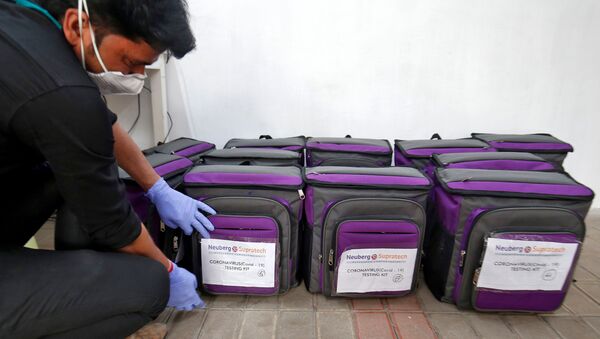The head of India’s premier research and development organisation said it has generated complete synthetic routes of these drugs and can go to mass production, once regulatory approvals are obtained.
“We have generated complete synthetic routes of these drugs, so that as and when regulatory approvals are obtained, we will be ready to make them. The process of synthesis has been transferred to some pharmaceutical companies in India", said Shekhar C. Mande, Director General of Council of Scientific and Industrial Research (CSIR) under the federal Ministry of Science and Technology.
“Some of the drugs which are not in the solidarity trials are being fast-tracked in CSIR laboratories for example, favipiravir, arbidol etc. If these are able to clear the clinical trials and are approved by the regulatory authorities, India will have these available soon", explained Mande in an exclusive interview with Sputnik.
Favipiravir is an anti-retroviral drug, proved effective for treating influenza viruses and is currently being tested by several countries including China, Russia, and Japan as a potential treatment against the novel coronavirus.
The solidarity trial is a multinational initiative by the World Health Organisation and partners to compare four untested treatments for hospitalised people with severe COVID-19. India is part of these trials.
CSIR is also involved in preparing reagents for Reverse Transcription Polymerase Chain Reaction (RT-PCR) kits, including the RT enzyme. Currently, most of these reagents are imported from overseas.
Besides this, the National Aeronautical Laboratory under CSIR has developed a personal protection suit for medical personnel that has received regulatory approval and this technology has been transferred to private manufactures. Mande said one manufacturer has already started production and would deliver 50,000 suits in a week, while it is ramping up production capacity to 30,000 suits per day.
CSIR has a network of 38 national laboratories, 39 outreach centres, 3 innovation complexes, and five units. It works in diverse science and technology areas – from radio and space physics, oceanography, geophysics, chemicals, drugs, genomics, biotechnology and nanotechnology to mining, aeronautics, instrumentation, environmental engineering, and information technology. Indian Prime Minister Modi is the president of CSIR, while the federal Science and Technology Minister is its vice president.
India, which detected its first COVID-19 case on 30 January, has has more than 23,000 cases as of Friday. Some 4,748 people have been cured and discharged from hospitals across the country. So far 718 people have succumbed to the infection.


